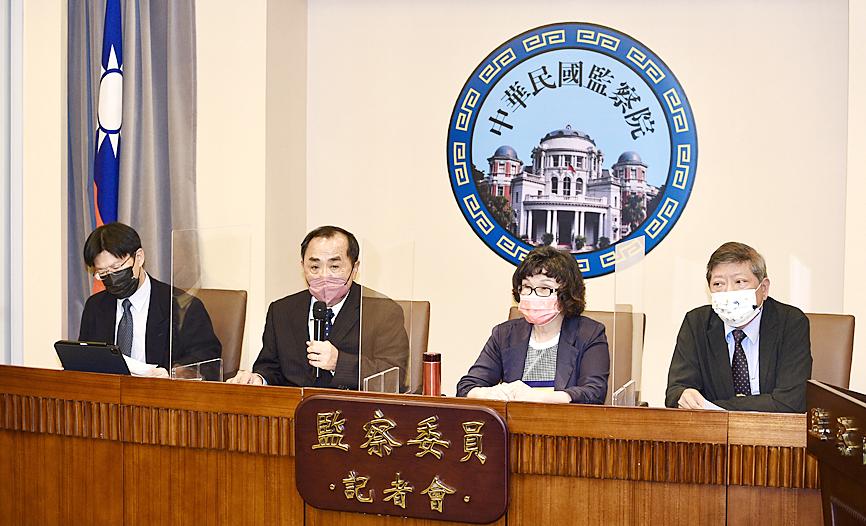The Control Yuan yesterday asked the Judicial Yuan’s Disciplinary Court to retry former Academia Sinica president Wong Chi-huey’s (翁啟惠) case after the court reprimanded Wong for not fully disclosing his assets and failing to recuse himself in a matter that could have led to a conflict of interest.
Wong, accused of having made illicit gains by purchasing OBI Pharma stock, was acquitted by the Shilin District Court in December 2018.
However, he was impeached by the Disciplinary Court in 2017 for not fully disclosing his assets during an asset report, a decision he has already appealed twice.

Photo: Peter Lo, Taipei Times
The March 8 amendment of Article 14-1 of the Enforcement Rules of the Control Act (監察法施行細則) gave Wong reason to launch another appeal.
“Should the [Disciplinary Court] find that there are grounds to reinvestigate a case, it should dispatch, or alternate between, two members of the former court presiding over the case to head the reinvestigation,” Article 14-1 states.
Wong is an internationally acclaimed academic and his reputation should not be impugned, Control Yuan members said yesterday, adding that he would not be the only individual to benefit from Article 14-1.
Freedom to conduct research is a constitutionally guaranteed right, and Academia Sinica, as the highest institution for independent research in the country, should have its research protected, they said.
The members called on the court to respect Academia Sinica’s decision regarding allegations that Wong had not recused himself from acts that might have caused a conflict of interest.
The Academia Sinica Principles on Handling Conflict of Interest (中央研究院科技移轉利益衝突迴避處理原則) as they stood on Aug. 14, 2012, did not make a distinction between the position a person held as an administrator or as an academic, they said.
There was no correlation between Wong as the creator of the technology being transferred, and Wong the institute’s highest-level administrator, the members said, adding that he had followed the rules and filled out the form declaring the possibility of a conflict of interest.
The regulations as they stood in 2012 did not state that the technology’s creator could not become a stock owner, the members said, adding that Academia Sinica’s opaque regulations on conflicts of interest should not carry over to an individual who had followed rules.
The Control Yuan’s investigation has found that, based on new evidence and facts, the original basis for the court reprimanding Wong was no longer valid, the members said.

Taiwan has received more than US$70 million in royalties as of the end of last year from developing the F-16V jet as countries worldwide purchase or upgrade to this popular model, government and military officials said on Saturday. Taiwan funded the development of the F-16V jet and ended up the sole investor as other countries withdrew from the program. Now the F-16V is increasingly popular and countries must pay Taiwan a percentage in royalties when they purchase new F-16V aircraft or upgrade older F-16 models. The next five years are expected to be the peak for these royalties, with Taiwan potentially earning

STAY IN YOUR LANE: As the US and Israel attack Iran, the ministry has warned China not to overstep by including Taiwanese citizens in its evacuation orders The Ministry of Foreign Affairs (MOFA) yesterday rebuked a statement by China’s embassy in Israel that it would evacuate Taiwanese holders of Chinese travel documents from Israel amid the latter’s escalating conflict with Iran. Tensions have risen across the Middle East in the wake of US and Israeli airstrikes on Iran beginning Saturday. China subsequently issued an evacuation notice for its citizens. In a news release, the Chinese embassy in Israel said holders of “Taiwan compatriot permits (台胞證)” issued to Taiwanese nationals by Chinese authorities for travel to China — could register for evacuation to Egypt. In Taipei, the ministry yesterday said Taiwan

Taiwan is awaiting official notification from the US regarding the status of the Agreement on Reciprocal Trade (ART) after the US Supreme Court ruled US President Donald Trump's global tariffs unconstitutional. Speaking to reporters before a legislative hearing today, Premier Cho Jung-tai (卓榮泰) said that Taiwan's negotiation team remains focused on ensuring that the bilateral trade deal remains intact despite the legal challenge to Trump's tariff policy. "The US has pledged to notify its trade partners once the subsequent administrative and legal processes are finalized, and that certainly includes Taiwan," Cho said when asked about opposition parties’ doubts that the ART was

If China chose to invade Taiwan tomorrow, it would only have to sever three undersea fiber-optic cable clusters to cause a data blackout, Jason Hsu (許毓仁), a senior fellow at the Hudson Institute and former Chinese Nationalist Party (KMT) legislator, told a US security panel yesterday. In a Taiwan contingency, cable disruption would be one of the earliest preinvasion actions and the signal that escalation had begun, he said, adding that Taiwan’s current cable repair capabilities are insufficient. The US-China Economic and Security Review Commission (USCC) yesterday held a hearing on US-China Competition Under the Sea, with Hsu speaking on